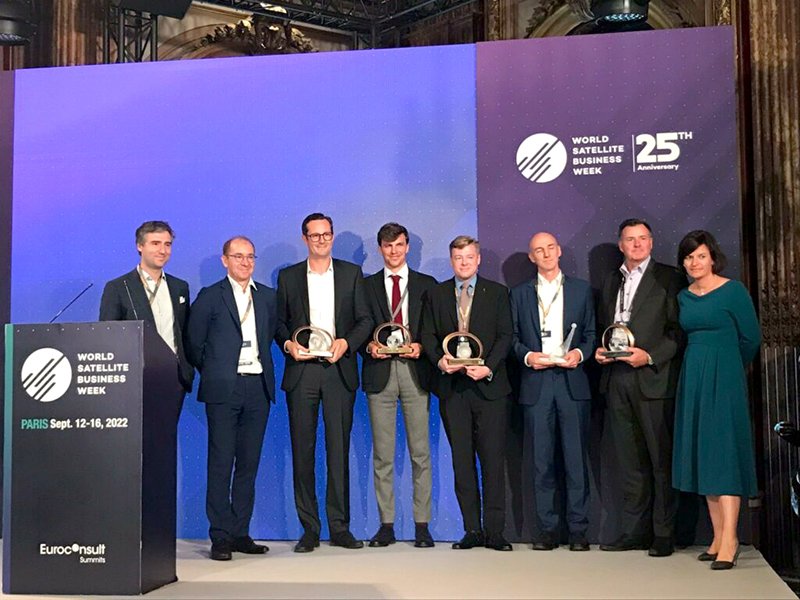Space resources and infrastructure have a major part to play in the realm of sustainability. The Space Sustainability Rating (SSR) at eSpace – the EPFL Space Center is working to incentivise all space actors to take a leading role in helping to realise the ambitions of the SDGs, and deliver positive impact both in space and on Earth.
It is currently Global Goals Week, an annual week of action, awareness, and accountability for the Sustainable Development Goals (SDGs), alongside the UN General Assembly. This event serves as a stark reminder that, as outlined in the annual Sustainable Development Goals Report 2022, the world is not on track to meet the SDGs by the 2030 deadline. To accelerate progress toward achieving the SDGs, governments, business and civil society all have a part to play, along with space actors.
Space infrastructure at the service of sustainability on Earth
When one thinks of the SDGs, outer space may not be the first thing that comes to mind. However, the resources offered by space infrastructure can be harnessed to steer progress for many of the 17 goals by tackling increasing inequality, environmental degradation and climate change, as highlighted by the Space4SDGs initiative led by the United Nations Office for Outer Space Affairs (UNOOSA).
Space-based services and technologies, such as Earth observation, geolocation and telecommunications, and for monitoring climate change and greenhouse gas emissions are all vital in helping to predict and enhance disaster risk reduction and response strategies, as well as aiding important climate research.
“The space satellite plays a key role in the study of climate,” said Yves Le Gall, Director of the National Centre for Space Studies in France (CNES) at the COP 21 in Paris in 2015. “Of the 50 parameters to measure the climate, 26 are obtained from space.”
In addition, by facilitating connectivity, the space sector has the potential to contribute across all 17 of the SDGs. And space technologies also promote and expand science, technology, engineering, and mathematics (STEM) education, which can work towards inclusion and gender equality.
Space sustainability as a development goal
Despite the essential role of space in achieving the SDGs, the sustainability of the space environment itself is still missing the universal framework and language for sustainable development defined by the SDGs. An unsustainable and unsafe space environment jeopardises not only the success of space missions in the long-term, but is also likely to hamper progress for sustainable and inclusive development on Earth. Recently, the increasing number of satellites launched, driven by the emergence of new actors and commercial satellite constellations in low-Earth orbit, has amplified these concerns. In addition, new-comers, such as lower income countries that have not previously been able, should have the ability to access space, which makes its sustainable use all the more necessary.
This has fuelled the global discussion around the development of a potential additional SDG 18 dedicated solely to space, led by a growing number of experts and industry leaders in the space community. The SDG 18 – SPACE FOR ALL initiative, which included the PLAnetary SUStainability (PLASUS) 21 workshop that took place last year and the SDG.SPACE workshop that was held earlier this year, has positioned space as an SDG in global discussion.
Incentivising the space industry to catalyse sustainable action
It is this focus on space sustainability that is at the core of what eSpace does as the operator of the Space Sustainability Rating (SSR). Preserving our space environment both for its impact on the ground as well as to ensure its fair and safe use for generations to come is why fostering voluntary action from space actors is so important.
The SSR encourages sustainable behaviour in space by providing space operators with ratings on the sustainability of their space missions. These ratings also come with concrete advice on how to make each mission more sustainable. Satellite manufacturers and spacecraft operators can all use the SSR to get a clear picture of where they stand on sustainability, identify potential improvements, and communicate to investors and the public around their sustainability scorecard and strategies. The first official rating was issued in June 2022, and a number of industrial actors are currently engaged with the SSR team to start completing assessments.

“As concerns about the long-term use of the space environment and the challenges due to space debris are intensifying, sustainable and responsible behaviour must become a norm in outer space,” says Florian Micco, Project Manager of the SSR. “We hope space actors across the globe will join us in developing best space sustainability practices.”
In recognition of the SSR’s role in incentivising sustainable behaviour in space, it was awarded Euroconsult’s Sustainable Development & Business Award at the World Space Business Week (WSBW) organised by Euroconsult meeting in Paris this week.
As more and more satellites and other objects are sent up into space in the coming years, the risk of collisions will grow, causing an increase in space debris and the danger to spacecraft that do important Earth monitoring and provide essential services. This increased space traffic, if not managed sustainably, also raises the possibility that we will lose the dark and quiet skies that are important for important research that help achieve sustainability goals and are an important part of the heritage of humanity.